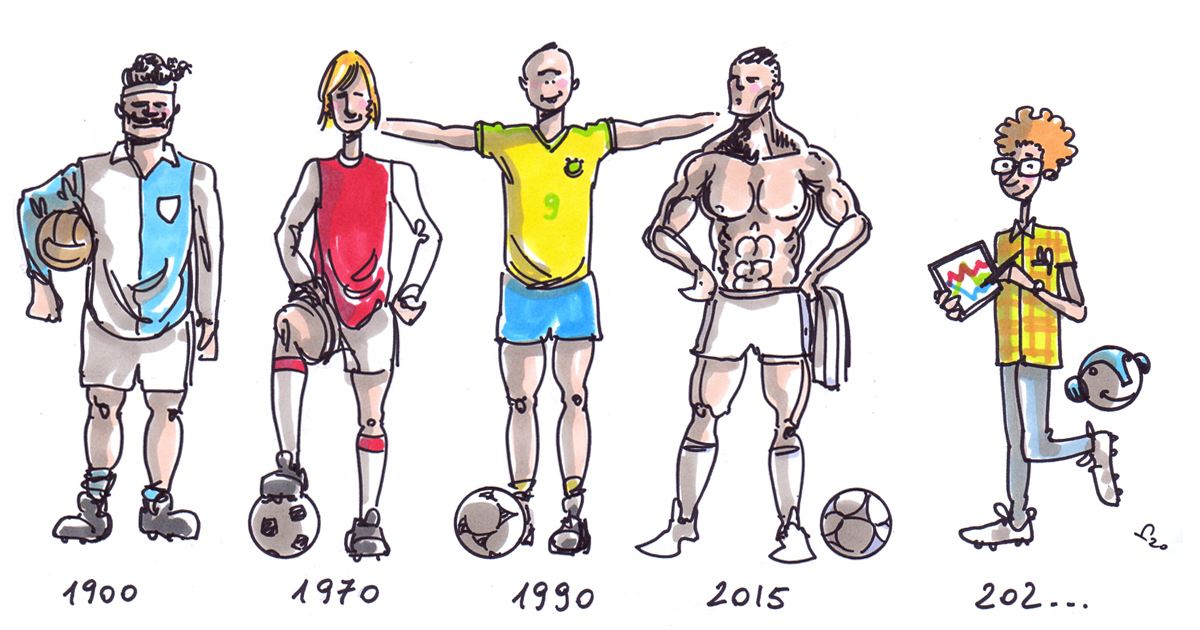Key person risk is common in entrepreneurial companies which are heavily reliant upon the talents and vision of a founder.
One needs only look at Apple’s dearth of product innovation since Steve Jobs’ death to see the importance of a “key person” on a large scale.
Imagine the task of trying to identify a “Steve Jobs” every couple of years, and then empowering that person to revamp your company’s operations and staffing at significant expense. What if there were dozens of well-resourced competitors also constantly seeking the same kind of candidate? What are the odds that all of them will succeed? Building a sound organizational infrastructure with consistent culture, systems, and philosophies seems a far more logical and robust operating model, no?
Are football clubs primarily sporting enterprises
or entertainment businesses?
It seems to me that many football clubs behave like the Hollywood producers who seem to think it a good idea to pour seemingly endless amounts of money down the “Nicholas Cage stars in an awful movie” hole.
When will “professional” football clubs realize that the omnipotent manager model is a vestige of a bygone era?
Has Jose Mourinho suddenly become a poor tactician, lost his eye for a player, or become too old to relate to the modern player? Has the game passed by the likes of Benitez, Ancelotti, and Wenger?
When looking at modern sporting clubs/franchises that build sustainable competitive advantages, they invest in systems and infrastructure rather than obsessing over short-term goals: systems over goals. As I look across the European football landscape, I see clues as to which clubs are focusing on systems and which focus upon shorter term goals.
Table 1 shows the domestic league non-penalty xG, xG conceded, and xG differential for several of the big 6 clubs in England, as well as other elite clubs in Europe over the past five seasons.
Note the seeming lack of consistency or improvement within this group. These are clubs, I would surmise, stuck in the past, with manager-centric models. They remain on a failed merry-go-round of sacking managers, player turnover, big spending, and performance levels which appear relatively random and volatile.

– table 1.
In the “Big Five” leagues, consistently producing a non-penalty xG differential of around 1 appears to be the threshold for which a robust organisational system should target. For aspirational clubs in smaller leagues, such as Salzburg and Ajax, competing against elite clubs in the Big Five, requires performance level of xG differentials in the range of 1.25-1.50+ in their domestic leagues.
Clubs dominating lower quality domestic leagues, such as Celtic and Dinamo Zagreb, should be targeting consistent differentials of 2+ to consistently qualify for the Champions League and legitimately compete for the Europa League trophy.

– table 2.
Of course, causation versus correlation
is always a potential issue.
 I included Manchester City within a group of clubs who appear to have invested in big data and analytics to create organisational system which may transcend manager turnover – assuming discipline is maintained. The mystifying tactical and selection decisions made in last week’s Lyon loss by Guardiola, combined with reports that have only really entered the modern big data arms race over the past year, suggest to me that Manchester City have been overwhelming with big money and top players. This combined with a talented, if imperfect, manager. Even if Guardiola is a “Steve Jobs”, he will have his versions of Jobs’ NeXT and Apple Lisa product failures.
I included Manchester City within a group of clubs who appear to have invested in big data and analytics to create organisational system which may transcend manager turnover – assuming discipline is maintained. The mystifying tactical and selection decisions made in last week’s Lyon loss by Guardiola, combined with reports that have only really entered the modern big data arms race over the past year, suggest to me that Manchester City have been overwhelming with big money and top players. This combined with a talented, if imperfect, manager. Even if Guardiola is a “Steve Jobs”, he will have his versions of Jobs’ NeXT and Apple Lisa product failures.
What does Barcelona’s appointment of Ronald Koeman suggest?
 Is he an agent of change likely to trailblaze a new path?
Is he an agent of change likely to trailblaze a new path?
Or, more likely, just another manager appointed as Barcelona’s leadership flails about trying to salvage the last years of Messi’s career?
Perhaps someone of Xavi’s stature could catalyse the required cultural change, should he be sufficiently “plugged in”. Otherwise, Barcelona may have to crash and burn post-Messi to initiate the required changes.
Will Liverpool sustain its culture and robust system
after Klopp’s eventual departure?

Change typically introduces risks and the potential for bad ideas to re-emerge.
Liverpool’s “sister” club in MLB, the Boston Red Sox, awakened to “Moneyball” after John Henry purchased the team in 2003 and hired Bill James, who had been the “Grandfather” and pioneer of advanced baseball statistics.
After having suffered from the “Curse of the Bambino” following the sale of Babe Ruth to the New York Yankees on Boxing Day 1919, the Red Sox finally won the World Series in 2004. They proceeded to build one of the best player development systems in baseball, which produced a steady supply of young talent, and the team remained a perennial contender, including winning the World Series again in 2007 and 2013.
The team experienced poor seasons in 2014 and 2015, the player development-focused General Manager was fired, and an “old school” baseball man, Dave Dombrowski, was hired to run the team. In addition, he was given more power and the title of President of Baseball Operations. Dombrowski followed the path he had at prior clubs, which is to say he traded much of the team’s pipeline of promising young talent to acquire current “stars”, while spending massive amounts on aging free agents. Like a shot of adrenaline, the club improved and returned to winning the World Series again in 2018. Unsurprisingly, the shift away from a robust system towards a shorter-term goal resulted in the adrenaline wearing off, the Red Sox suffering a mediocre season in 2019, and Dombrowski’s exit.
The Red Sox returned to the “system” by replacing Dombrowski with someone rooted in the foundation which had driven the team’s success from 2004-2013. That period included the 8-season tenure of Terry Francona as the on-field manager, who is renowned for his interpersonal skills and having bought into modern analytics. They replaced Francona with two successive managers, who were not considered strong with either characteristic. Even with Dombrowski’s wild spending spree, the club did not win the 2018 World Series, until they hired another manager with characteristics like Francona.
Ultimately, sporting clubs/franchises are a “people” business.

Robust systems can be developed, with modern big data and analytics at the core, but culture and leadership remain a never-ending variable! Staying on the hamster wheel of short-term priorities can lead to fleeting success. However, the era of football managers achieving sustained success by shooting from the hip is over. Clubs that make the necessary investment in data, technology, and cross domain analytics expertise must still be led by people wise enough to trust systems over short-term goals.
Embracing robust long-term systems and hiring managers
who buy into a club’s modern culture
will be paramount.
Rather than recycling the same managerial retreads and allowing them to exercise dictatorial powers, clubs would be wise to look towards emerging young talent of those clubs, which are are already beginning to thrive in this new paradigm. Rather than Ancelotti, Mourinho, and Koeman, clubs would be better off hiring people who have learned under and worked with the likes of Ralf Rangnick, for example.

Football operations, analysts, and similar human resources should be approached similarly, and are just as important as the manager position. Managers should focus upon getting the most collectively out of the first team and collaborating with other club resources to assist with optimizing decision making within the strategic system.
Attracting and investing in the best young and ambitious talents, like Leipzig has with Julian Nagelsmann, is like the successful path modernising clubs have pursued in North American sports. The Red Sox replaced the then 63-year-old Dombrowski, with 36-year-old Chaim Bloom. He had been second in command at the Tampa Rays. His boss at Tampa, Matthew Silverman, had assumed the role of president at the club when he was 32. There will be some old dogs who learn new tricks but, for many, it will be far easier to offer promotions to the up and coming “new dogs” who have already been a part of system-driven cultures.
Fortunately, humans remain flawed.
Massive egos and hubris remain endemic, and clubs will rise and fall like they always have, as leaders exercise poor judgement or capitulate to the never-ending mob mentality of football supporters hyper-focused on the latest match.
Various types of systems are likely to be successful depending upon each club’s culture, financial resources, league, etc. However, there is likely to be a long runway of competitive advantage for those clubs with leadership which embrace these ideas and innovate within their own cultures.
To read all about our work with start-ups and scale-ups, click here.
To find out what we do in change management, see here.
Here you can check out our content development work.
Discover our corporate learning programmes.
If you are interested in our own story, check us out here.



